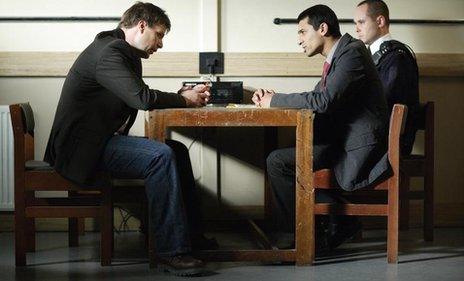Who, what, why: Why do police still use cassette tapes?
- Published

A tiny number of music cassette tapes are sold in the UK every year, but police forces are still using millions of them. Why?
For many people, the audio cassette tape conjures up memories of teenage mix tapes.
But for many of the police forces in the UK, cassettes are still the primary format for recording interviews.
An interview will result in a master tape being produced - duplicates are then submitted as evidence at court or disclosed to the defence.
In 2011, The National Police Improvement Agency (NPIA) estimated that, external that up to 200,000 tapes are used by each force a year.
There are currently 43 police forces in England and Wales, meaning the police are using millions every year.
While some police services are piloting systems with digital recording, 90% of the two million interviews carried out in 2011 were recorded on to tape.
"Although cassette tapes are still used to store the majority of interviews undertaken, we are moving towards digital," says a Met Police spokesman.
"Some of our newer custody suites are equipped with digital recording facilities and in time, cassette will be phased out."
Though newer police stations are moving towards CD and digital recording, it seems like the tape will be used for a number of years to come.
After their introduction into interview rooms in 1988, it was not until 1991, external when the tape recording of interviews became "standard police practice" - the same year that the MP3 encoding format was invented.
Some police officers believe in retaining it on the principle of "if it ain't broke, don't fix it".
"It's not like we can walk down to Dixons and pick up some recording device to plug in your stick drive and record it," says Inspector Neil Carlton, of Cumbria Police.
"That wouldn't be enough for the security we need.
"[Tapes are] a very simple system, it's a very good system. It's been sealed in the person's presence, with their signature and the solicitor's if there. If the seal's been opened, it's really obvious."
The Home Office says that the use of recording devices is not mandated centrally. This means that it is up to individual constabularies to decide what they should record on to.
Cumbria Constabulary announced a plan, external to erase the cassette from interview rooms. But £360,000 for the changeover proved a little bit difficult to budget for and the plan is yet to be pushed through.
"If the supply [of tapes] runs out then we would have to change but it's not, so luckily there's no rush for us," says Insp Carlton.
"The cost of that is so high, we currently see no point in changing.
"If we had loads of money, we would probably change [to digital] because it is more convenient but there's no guarantee they would be any safer because, if we do record something digitally, there has to be a programme to protect that digital recording to make it safe."
The tape, first shown off by Philips at the Berlin Radio Show in 1963, a year after its invention, is more than double the age of the world wide web but only 17 years older than the compact disc.
"Initially, I don't think Philips realised how versatile their invention was," says Eric Mason, director of West Manufacturing Industry, which produces bulk orders of tapes - alongside other media - to be sent around the world.
He believes the tape remains in use because of its versatility and cost efficiency.
"If you stop an interview tape, for example, to begin a brief discussion away from the tape, it restarts where it left off. It's incredibly versatile. With a CD, it is not so straightforward," he says.
"It has an ease of portability, where you can take it anywhere in the world and play it anywhere with a cassette deck. New technology tends to be more expensive and, in many cases, requires software to use it."
But away from the practical uses for tape, in the UK at least, as a mass format for music releases, its time seems to have been and gone.
The Concise Oxford English Dictionary removed the term "cassette tape" in 2011.
But in police interview rooms at least, it lives on.
Reporting by Alex Hudson
You can follow the Magazine on Twitter, external and on Facebook, external